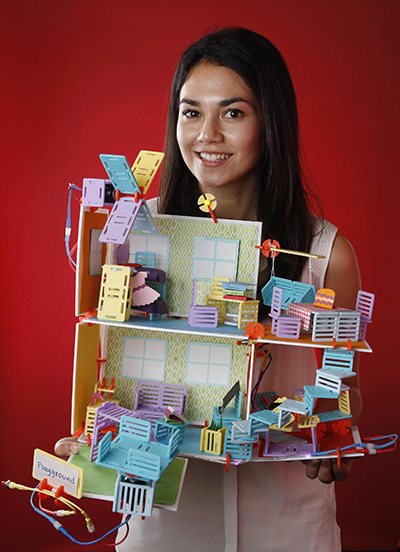How Do You Introduce STEM to Girls? Hack a Dollhouse.
-
-
slice.mit.edu
- 2
Filed Under
Recommended

When Alice Brooks '10 was eight years old, she asked for a Barbie for Christmas. To her surprise, her father told her that Santa Claus didn’t bring dolls.
“Santa brought me a saw instead,” Brooks says. “It worked out great. I ended up building a dollhouse.”
That gift sparked a passion for science and engineering that eventually led her to co-create the Roominate, a construction kit for a dollhouse that can be electrically wired. Time magazine called it the number one toy of 2014.
While in graduate school in 2012, Brooks and fellow Stanford student Bettina Chen recalled shared childhood experiences of building and making. But after looking at the modern toy market for girls ages six to 10, they saw little that spoke to the same interests.
“We wanted to create an engineering product that would be exciting and fun,” she says. “Girls love dolls and stuffed animals. But they also love Legos and Lincoln Logs, too.”
After months of research, Brooks and Chen launched Roominate through the crowdfunding platform Kickstarter. They reached their $25,000 goal in less than five days, raised more than $85,000 in 30 days, and sold nearly 1,800 units.
"We were amazed by what these girls built—it went way beyond a dollhouse,” says Brooks. “We got pictures of doggy hotels, car washes, a cotton-candy maker, and a fully lit Golden Gate Bridge—completely built from their imagination.”
Roominate on Shark Tank. Video via abc.go.com.Roominate’s popularity further increased in September 2014, when it was featured on Shark Tank, a television series that showcases entrepreneurs making business proposals to a panel of investors. Two “sharks,” Mark Cuban and Lori Greiner, combined to invest $500,000 for a 5 percent equity share. Cuban’s investment was contingent on a promise that Brooks and Chen would mentor his two young daughters.
“We e-mail weekly with Mark, and he’s been really helpful,” Brooks says. “A lot of his ideas are influenced by what he sees from his girls, who are in Roominate’s target age. The partnership has been great.”
A Massachusetts native, Brooks received a master’s degree in mechanical engineering from Stanford and still lives in Northern California. She says the company’s long-term goal is to create even more opportunities for young girls to fall in love—and stay in love—with science and engineering.
“We’re taking in feedback and stepping up the complexity,” she says. “We have a lot of things coming this year. Girls’ interests are always changing, and we want to evolve with them.”
This article originally appeared in the May/June 2015 issue of MIT Technology Review magazine.








Comments
DCM
Tue, 04/28/2015 5:04am
To the extent this teaches girls to do for themselves instead of demanding men do everything for them -- instead of making them assume men are slaves -- it's a good thing.
Steve Dutch
Mon, 04/27/2015 10:24pm
Hooray for her dad! I grew up in a house where, if something didn't work, you took it apart. My wife once said she wanted a tool kit for Christmas, but never got one. It took me a while to convince her you could take something apart, figure out how it worked, and fix it, even if you'd never done it before. I may have succeeded a little too well. Protip: if you're handy, the first time your SO asks you to hang a picture, nail your finger to the wall. It will hurt like blazes but you have NO idea how much trouble it will save you in the long run.